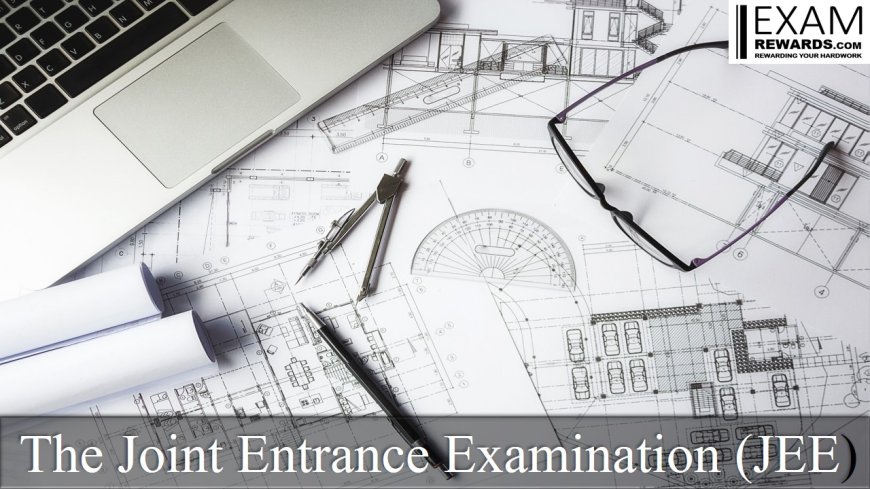The Joint Entrance Examination (JEE)
Video Lectures Notes Mock Tests
The Joint Entrance Examination (JEE)
TABLE OF CONTENT
1. OVERVIEW
2. ABOUT EXAM
3. MODE OF SELECTION
4. ELIGIBITY
5. HOW TO FILL EXAM FORM
6. SELECTION PROCESS
7. SYLLABUS
OVERVIEW-
|
Exam Name |
The Joint Entrance Examination (JEE) |
|
Number of Seats |
Coming soon |
|
Education Qualifications |
Candidates must have completed their 10+2 or equivalent examination from a recognized board. They should have studied Physics, Chemistry, and Mathematics as core subjects. |
|
Age limit |
There is no specific age limit for JEE Main. However, candidates must check the age criteria of the institutes they plan to apply to, as certain institutions might have age-related requirements. |
|
Registration Date |
Coming Soon |
|
Mode of Application |
Online |
|
Mode of Exam |
Online |
|
Official Notification PDF |
|
|
Application Link |
Coming soon |
|
Admit card Link |
Coming soon |
|
Result Link |
Coming soon |
About Exam-
The Joint Entrance Examination (JEE) is one of the most prestigious and challenging engineering entrance exams in India. Conducted in two phases - JEE Main and JEE Advanced - this exam opens doors to some of the country's top engineering institutes like the Indian Institutes of Technology (IITs), National Institutes of Technology (NITs), and other reputed institutions. In this blog, we'll delve into the key aspects of the JEE exam, preparation strategies, and essential tips to excel in this rigorous test. For more Information read full article by examrewards.com
MODE OF SELECTION:-
· JEE Main Selection: JEE Main serves as the preliminary stage of the selection process. Here's how the selection process works:
· Eligibility Criteria: Students who have completed their 10+2 education or its equivalent are eligible to appear for JEE Main.
· Scoring Mechanism: The examination evaluates candidates on their knowledge of Physics, Chemistry, and Mathematics. Based on their performance, candidates are assigned a normalized score. This score is utilized for admissions into National Institutes of Technology (NITs), Indian Institutes of Information Technology (IIITs), Government Funded Technical Institutions (GFTIs), and is also a criterion for JEE Advanced eligibility.
· Rank Calculation: The final JEE Main rank is determined by a combination of the candidate's JEE Main score and their normalized board exam score. The All India Rank (AIR) is used for admission to various institutions.
· JEE Advanced Selection: JEE Advanced is the next phase of selection for candidates who aim to secure a seat in prestigious institutions like the Indian Institutes of Technology (IITs). The selection process is as follows:
· Eligibility: Only the top 2.5 lakh (approximately) candidates from JEE Main are eligible to appear for JEE Advanced.
· Performance in JEE Advanced: JEE Advanced assesses candidates' in-depth understanding of concepts and problem-solving skills. It is designed to be more challenging than JEE Main.
· Ranking in JEE Advanced: Based on their performance in JEE Advanced, candidates are ranked, and admissions to IITs are offered according to their rank and preferred choices of branches and institutes.
· Cutoff Ranks: Each IIT declares its own cutoff ranks for various courses. Candidates who meet these cutoffs during counseling rounds are offered seats.
· Counseling and Seat Allocation:
· After the declaration of JEE Advanced results, candidates need to participate in the centralized counseling process, commonly known as JoSAA (Joint Seat Allocation Authority) counseling. Here's how it works:
· Online Choice Filling: Candidates fill in their preferred choices of institutes and engineering branches online.
· Allocation Rounds: JOSAA conducts multiple rounds of seat allocation based on candidates' ranks, choices, and the availability of seats in different institutions.
· Acceptance and Reporting: Once a seat is allocated, candidates must accept the seat online and report to the respective institute for further formalities.
ELIGIBILITY
Eligibility Criteria for JEE Main:
· Educational Qualification: Candidates must have completed their 10+2 or equivalent examination from a recognized board with Physics, Chemistry, and Mathematics as core subjects.
· Year of Qualification: Those who are appearing for their 10+2 examination in the same year as the JEE Main can also apply.
· Age Limit: There is no specific age limit to appear for JEE Main. However, candidates should check the age criteria of the institutes they intend to apply to, as some institutions might have age-related eligibility conditions.
· Number of Attempts: Candidates can attempt JEE Main for a maximum of three consecutive years.
· Subject Combination: Candidates must have taken five subjects in their 10+2 examination, including Language, Physics, Mathematics, Chemistry, and one additional subject.
· Number of Subjects in JEE Main: For calculating the JEE Main percentile, candidates must have taken at least five subjects in their 10+2 examination. In case a candidate has appeared in fewer than five subjects, the percentile calculation might not be possible, and the candidate might not be eligible for JEE Main.
Eligibility Criteria for JEE Advanced:
· Performance in JEE Main: Only the top 2.5 lakh (approximately) candidates who score the highest in JEE Main are eligible to appear for JEE Advanced.
· Number of Attempts: Candidates can attempt JEE Advanced for a maximum of two consecutive years.
· Age Limit: Candidates should be born on or after a specific date, as determined by the examination authorities. The age limit varies slightly each year, so candidates must check the official notification for accurate information.
· Number of Subjects in JEE Advanced: To be eligible for JEE Advanced, candidates must have taken at least six subjects in their 10+2 examination.
· Attempts in Previous Years: Candidates who have been admitted to an IIT in the past are not eligible to appear for JEE Advanced.
HOW TO FILL EXAM FORM
Online Registration:
· Visit the official JEE Main website.
· Click on the "Apply for JEE Main" link.
· Register using your email ID, mobile number, and other required details. A unique application number and password will be generated.
Filling Personal Details:
· Log in using the provided application number and password.
· Fill in your personal information, such as name, date of birth, gender, nationality, etc.
Academic Information:
Enter your educational details, including 10th and 12th examination details, board name, subjects, etc.
Choice of Exam Centers:
Choose your preferred exam cities from the available list. You'll be allotted an exam center in one of these cities.
Uploading Documents:
Upload scanned images of your photograph and signature as per the specified dimensions and formats.
Application Fee Payment:
Pay the application fee using the provided payment options, such as credit/debit card, net banking, or UPI.
Review and Submit:
· Double-check all the entered information and uploaded documents.
· Submit the application form.
Print Confirmation Page:
After submission, download and print the confirmation page for future reference.
Filling the JEE Advanced Application Form:
Qualify in JEE Main:
Only candidates who qualify in the JEE Main and meet the eligibility criteria are eligible to appear for JEE Advanced.
Online Registration:
· Visit the official JEE Advanced website.
· Click on the "Register for JEE Advanced" link.
· Enter your JEE Main roll number and other required details.
Filling Personal and Academic Details:
Fill in your personal and academic information as required.
Upload Documents:
Upload scanned images of necessary documents, such as photograph, signature, and other required certificates.
Application Fee Payment:
Pay the application fee through the provided payment options.
Choice of Exam Centers:
Choose your preferred exam centers from the available list.
Review and Submit:
Review all the entered details and make corrections if needed.
Submit the application form.
Print Application Form:
After submission, download and print the application form and keep it for future reference.
SELECTION PROCESS:
1. Registration and Application:
· Register on the official JEE website.
· Fill in personal, educational, and contact details.
· Upload scanned images of your photograph, signature, and other required documents.
· Pay the application fee through the available payment options.
· Review the application details and submit before the deadline.
2. Admit Card Issuance:
· Download the admit card from the official website using your application number and password.
· The admit card contains crucial information such as your roll number, exam center details, and exam timings.
3. Examination Day:
· Arrive at the exam center well in advance.
· Carry the admit card, photo ID, and necessary stationery (pen, pencil, eraser, etc.).
· Follow the guidelines provided by the invigilators.
4. JEE Main Exam:
· The JEE Main consists of multiple-choice questions (MCQs) and numerical value-based questions.
· The exam is conducted in computer-based mode.
· Each correct answer usually carries 4 marks, and incorrect answers may have negative marking (usually -1 mark for MCQs).
5. JEE Advanced Exam:
· JEE Advanced includes multiple-choice, numerical answer-type questions, and match-the-following questions.
· The exam assesses deeper conceptual understanding and problem-solving skills.
· The paper is divided into different sections for Physics, Chemistry, and Mathematics.
· The exam is also conducted in computer-based mode.
6. Exam Results and Scoring:
· JEE Main results are usually announced in percentile form, based on a normalization process.
· JEE Advanced results are released as ranks, and each subject's individual marks are provided.
· The rank determines your eligibility for various engineering institutes.
7. Counseling and Seat Allocation:
· Qualified candidates participate in centralized counseling (JOSAA or CSAB).
· Fill in your preferred institutes and engineering branches.
· Seat allocation is based on your rank, choices, and availability of seats.
· Accept the seat online and report to the allotted institute for further admission procedures.
8. Reporting and Admission:
· Visit the allotted institute with the required documents, admission fee, and acceptance letter.
· Complete the admission formalities, document verification, and payment procedures.
9. Academic Journey:
· Once admitted, begin your academic journey in the chosen engineering institute.
· Engage in coursework, practicals, projects, and extracurricular activities to make the most of your college experience.
JEE SYLLABUS
The Joint Entrance Examination (JEE) syllabus encompasses a wide array of topics in Physics, Chemistry, and Mathematics. This article takes you on an in-depth exploration of the syllabus, highlighting the key concepts and topics that you'll need to master for success in the JEE exams.
· Physics Syllabus: Physics covers a range of fundamental concepts and principles. Here's an overview of the major topics:
· Mechanics: Kinematics, Laws of Motion, Work, Energy, and Power, Rotational Motion, Gravitation.
· Thermodynamics and Kinetic Theory: Thermodynamic Processes, Laws of Thermodynamics, Kinetic Theory of Gases.
· Electromagnetism: Electrostatics, Current Electricity, Magnetic Effects of Current and Magnetism, Electromagnetic Induction, Alternating Current.
· Optics: Ray Optics, Wave Optics, Optical Instruments.
· Modern Physics: Dual Nature of Matter and Radiation, Atoms and Nuclei, Electronic Devices.
· Chemistry Syllabus: Chemistry is divided into Physical Chemistry, Inorganic Chemistry, and Organic Chemistry. Here are the key topics in each category:
· Physical Chemistry: States of Matter, Atomic Structure, Chemical Bonding and Molecular Structure, Chemical Thermodynamics, Equilibrium, Redox Reactions, Chemical Kinetics.
· Inorganic Chemistry: Classification of Elements and Periodicity in Properties, Hydrogen, s-Block Elements, p-Block Elements, Transition Elements, Coordination Compounds.
· Organic Chemistry: Basic Concepts, Hydrocarbons, Haloalkanes and Haloarenes, Alcohols, Phenols, and Ethers, Aldehydes, Ketones, Carboxylic Acids, Organic Compounds containing Nitrogen.
· Mathematics Syllabus: Mathematics is a critical component of the JEE syllabus. Here's a glimpse of the major topics covered:
· Algebra: Complex Numbers, Quadratic Equations, Progressions, Permutations and Combinations, Binomial Theorem.
· Trigonometry: Trigonometric Functions and Identities, Trigonometric Equations.
· Coordinate Geometry: Straight Lines, Circles, Conic Sections.
· Calculus: Limits and Continuity, Differentiation, Applications of Derivatives, Integration, Definite and Indefinite Integrals, Differential Equations.
· Vectors and 3D Geometry: Vectors, Three-Dimensional Geometry.












